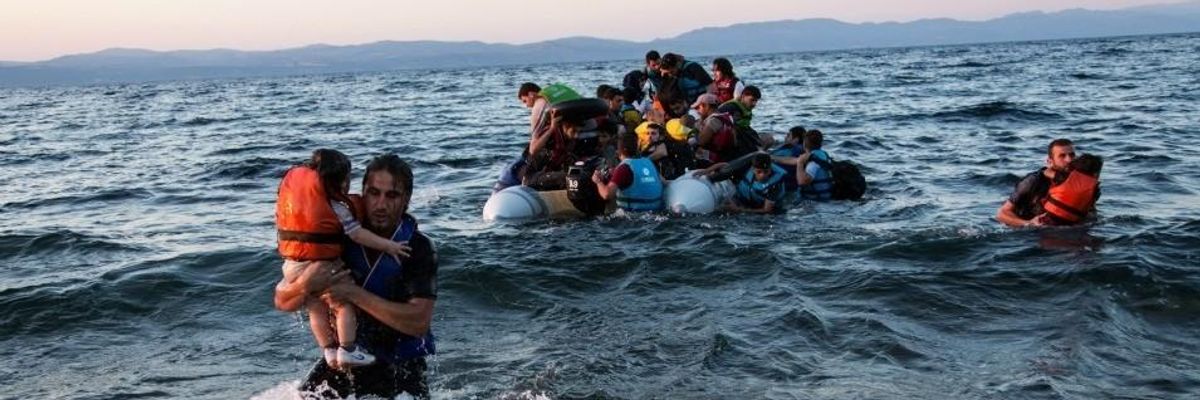In light of a historically low proposed refugee resettlement ceiling, migration policy has been a central issue in the 2020 United States presidential election. However, it is rarely discussed in conjunction with climate change. When it is, politicians often erroneously conflate people fleeing the effects of global warming with opportunistic economic migrants and summarily toss them aside.
The United States currently requires people seeking refugee status to prove a lack of national protection due to "persecution on account of race, religion, nationality, membership in a particular social group, or political opinion." Because environmental displacement doesn't meet this standard, millions face inexorable peril. Most recently, the U.S. refused to accept people displaced after climate-induced Hurricane Dorian devastated the Bahamas in August, leaving 70,000 homeless--roughly a fifth of the island nation's total population.
The effects of climate change extend far beyond the Bahamas--it's a worldwide crisis. Across Africa, Asia, and South America, people flee rising sea levels, desertification, and extreme weather. An International Organization of Migration report projects the impacts of climate change could displace up to 200 million people--twenty-five times the population of New York City--by 2050. Even worse, if global warming continues its steady climb, it will cause nearly 5 million deaths--primarily in developing nations--between 2030 and 2050.
If floods and wildfires can take lives as surely as bombs and bullets, why has the United States adamantly denied entrance to climate refugees? Because accepting this new category of stateless people would force us to confront our culpability in the climate crisis.
Despite President Trump's routine attacks on the legitimacy of climate change, our issue isn't one of mass ignorance; a recent nationally representative study showed that 7 out of 10 of Americans "believe climate change is happening" and 58% understand it is mostly human-caused. The moral disconnect comes in our refusal as a culture, as a government, and as a people to acknowledge the harm U.S. industrial might and consumerism cause worldwide.
The United States leads the world in carbon emissions on a per capita basis. Despite making up less than 5% of the world's population, we have generated over a quarter of global carbon emissions since 1850. Each year, the average American emits a whopping 16.1 metric tons of carbon into the atmosphere. On the flip side, those who contribute least to carbon emissions--the inhabitants of the least economically-developed regions--suffer the greatest consequences of climate change. For example, the average person from Bangladesh produces only 0.6 metric tons of carbon emissions annually, and yet 50,000 to 200,000 Bangladeshis flee river bank erosion every year.
Why not rely on other countries to take in climate refugees? The United States is particularly obligated to help this group of migrants not because they are stateless, but because we have made them so. In the same way that U.S. aggression made Vietnam uninhabitable in the 1970s, our carbon emissions are making many nations uninhabitable today. The U.S. government took responsibility for the conflict in Vietnam by providing asylum to survivors. Policymakers must now do the same for climate refugees. Through our disregard for the environment, we destroyed their countries and took away their national protection in the process. Though we can't restore climate refugees' homes or livelihoods, the least we can do is afford these stateless people opportunities for resettlement.
We have mentally distanced ourselves from the climate crisis up to this point because its impacts have been so far away. Because we couldn't see the fallout of our actions, we could pretend that they didn't exist. As much as we would like people halfway across the globe to indefinitely foot the bill for our excessive consumption, we have already experienced the chaos of climate displacement on U.S. soil. Unprecedented wildfires decimated California in 2018, proving climate change will catch up with us, too, faster than our coping and relief mechanisms can advance.
We know how to stop global warming, but we devote federal funds to researching foreign planets and a national "Space Force" instead. Is that our solution--to make climate refugees of us all?
The first step in stopping this crisis is to face the truth: we look to the heavens for answers because we have driven our planet to the brink of hell. As we prepare to vote in the 2020 elections, it is imperative that we take into account the climate crisis at hand. We must protect those displaced by climate change and take political action to mitigate it, because it may soon be too late.



